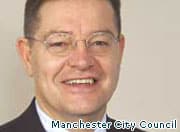Police and council officers will target street preachers in Manchester city centre as part of a crackdown on ‘nuisance’.
Manchester City Councillor Pat Karney has launched a taskforce, which will also look at removing pedlars, charity collectors and noisy musicians.
He said: “There’s pedlars selling tat, booksellers, preachers everywhere, chuggers and loud, noisy musicians.
Complete nuisance
“It is a complete nuisance walking through the city, which isn’t right.
“Over the next few weeks we will start to combat the problem, and make sure that the city becomes an even nicer place to visit.”
Manchester has a history of taking action against street preachers.
Last year, a street preacher received £13,000 in compensation from Greater Manchester Police, after being arrested and held in custody for 19 hours.
Preaching
John Craven had been preaching in Manchester city centre in September 2011 when two teenagers claimed they were offended by his views on homosexuality.
Mr Craven said the teenagers asked him what he thought of homosexuality. He answered by quoting from the Bible’s teachings on the subject, and said that “whilst God hates sin He loves the sinner”.
In 2008, a street preacher in Manchester was detained by police for over an hour after a member of the public complained when he read from a passage in Romans.
Complained
Miguel Hayworth had been reading from Romans 1:17-32, which discusses homosexuality.
A member of the public complained of ‘homophobic remarks’, but officers later released Mr Hayworth and he was permitted to continue preaching.
And in 2007, a homosexual man complained to the police about a church worker in Manchester distributing leaflets advertising Easter services.
Inoffensive
Julian Hurst was subsequently visited in his home by a police officer from the Race and Hate Crime Unit, who confirmed that the leaflet was inoffensive.
In 2013, The Christian Institute was part of a successful campaign against Government plans for IPNAs – Injunctions to Prevent Nuisance and Annoyance.
The proposed injunctions were widely criticised as being too vague, and opponents argued that street preachers and buskers might be targeted by them.

